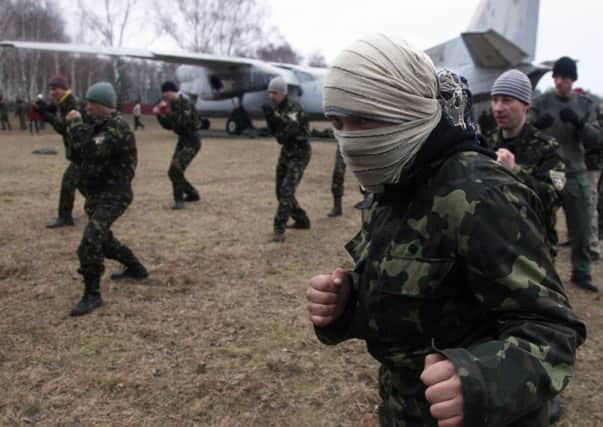Cameron defends ‘robust’ approach to Russia


The European Union and United States have imposed travel bans and asset freezes on senior Moscow officials, and the Prime Minister repeated his warning that there would be “further consequences” if Russia continued to destabilise its neighbour.
Foreign Secretary William Hague will face questions from MPs over the next steps in the dispute as one of his predecessors branded the international response “pathetic”.
Advertisement
Hide AdAdvertisement
Hide AdA referendum in Crimea - dismissed as illegal by Western allies - returned a 96 per cent vote in favour of splitting from Kiev and becoming part of Russia again.
The decree signed by Mr Putin is one of the steps which would formalise the annexation of the strategically-important peninsula but there are a number of formal obstacles that remain.
The treaty to annex Crimea has to be signed by leaders of Russia and Crimea, approved by the constitutional court and then be ratified by the parliament.
Mr Cameron insisted there had been a “clear, predictable and firm” response from the West to Moscow’s actions.
He said: “We’ve taken a robust approach. We’ve said that what happened in Crimea was wrong, and so there would be consequences, and already we’ve put in place measures.
“We’ve said that if Russia didn’t enter a contact group and start discussing these issues with Ukraine, there would be travel bans and asset freezes. There are now travel bans and asset freezes.
“And if Russia takes further action to destabilise the Ukraine and to threaten its territorial integrity, there will be further consequences.
“We have been clear, predictable and firm and consistent in the approach that we’ve taken and that is the right approach to take.”
Advertisement
Hide AdAdvertisement
Hide AdMr Hague said the UK “condemns in the strongest terms Russia’s flagrant disregard of Ukraine’s sovereignty and territorial integrity” and added: “For the UK and her allies, the Crimea remains part of Ukraine.
“We are witnessing a clear attempt to pave the way for the annexation of part of the sovereign territory of an independent European state, through military force and an illegal and illegitimate referendum.
“The UK calls again on Russia to enter into dialogue with Ukraine and with the international community to resolve this crisis through diplomacy and in accordance with international law, not to exacerbate it further through unilateral and provocative actions.
“Continuing to ignore those calls will bring serious consequences for Russia.
“We will urgently consider our response to this latest escalation with our allies and partners, including at the European Council this week.”
‘Pathetic’ response
But Tory former foreign secretary Sir Malcolm Rifkind was scathing about the international response to Russia.
He told BBC Radio 4’s Today programme: “This is the most dangerous crisis we have faced and it’s a crisis for Europe, not just for Ukraine.
“Already Russian troops have occupied the whole of Crimea, part of the territory of another country. If the reports are correct, they are about to annex that territory to Russia - first time since 1945 that something of that kind has happened.
Advertisement
Hide AdAdvertisement
Hide Ad“All that the international community have done so far is implement visa sanctions and asset freezes on 22/23 individuals.
“That is a pathetic response.”
Sir Malcolm said President Putin’s “real target” was to effectively control the former Soviet nations on the federation’s border.
“They won’t be formally all incorporated in Russia, I’m not saying that, but he wants to effectively make them Russian dependencies that have to do what they are told.”
Mr Cameron is due to join fellow EU leaders in Brussels for a pre-arranged summit on Thursday - two weeks after they met in emergency session to agree the need for sanctions.
Many EU member states have concerns about the impact on fragile European economies of imposing trade sanctions - notably given the heavy reliance of some on Russian gas.
US president Barack Obama said America was “ready to impose further sanctions”, depending on whether Russia escalated or de-escalated the situation in Ukraine.
If Moscow continued to intervene in Ukraine, he warned, it would “achieve nothing except to further isolate Russia and diminish its place in the world”.
US vice-president Joe Biden has arrived in Poland on a trip designed to show America’s resolve against Russia’s intervention in neighbouring Ukraine.
Ukrainian foreign minister Andrii Deshchytsya said his government was “prepared to defend our homeland” if Russian troops advance.
SEE ALSO: